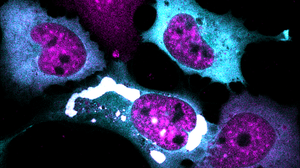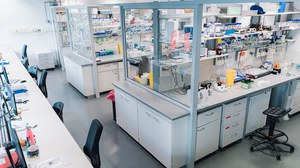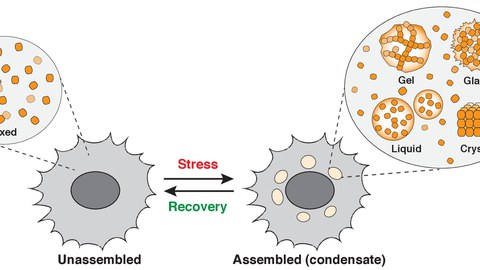Alberti Gruppe
Wir wissen immer noch sehr wenig über die Organisation des Zytoplasmas und die Rolle der membranlosen Kompartimente bei der Regulierung der Physiologie der Zellen. Meine Forschungsgruppe hat sich zum Ziel gesetzt, die molekularen Grundlagen der Organisation des Zytoplasmas aufzuklären. Wir sind besonders daran interessiert zu verstehen, wie sich das Zytoplasma bei Umweltstress verändert. Gestresste Zellen müssen ihre Physiologie und ihren Stoffwechsel an die neuen Bedingungen anpassen. Diese Anpassungen werden oft durch Veränderungen in der Struktur und Organisation des Zytoplasmas vermittelt. Unser Ziel ist es zu verstehen, wie diese Veränderungen das Überleben des Organismus fördern, aber wir sind auch sehr daran interessiert, wie sie Krankheiten verursachen.
 © Titus M. Franzmann
© Titus M. Franzmann
Unsere Forschung
The cytoplasm is a mysterious jelly-like substance that sustains the biochemical reactions that are vital for life. Understanding its organization remains a major challenge.
Cells organize their cytoplasm by forming compartments. While membrane-bound compartments have been studied for decades, membraneless compartments, also called biomolecular condensates, are just beginning to be understood. Biomolecular condensates form through biophysical phase transitions and are crucial for cell organization and function. However, as cells age, their ability to form proper condensates declines, leading to aberrant condensates linked to aging and diseases like neurodegeneration and cancer. Consequently, current research is focused on understanding how condensates are connected to age-related diseases.
Our lab investigates the molecular mechanisms that control the organization of the cytoplasm using biochemical, biophysical, genetic, and cell biological methods. We study various model systems, including yeast and mammalian cells, to explore how biomolecular condensates respond to environmental stress. We propose that stress-induced condensates help cells to quickly adapt to changing conditions. Additionally, condensates create specialized microenvironments that enhance or inhibit key biochemical processes in cells, such as signaling, DNA damage repair, transcription, or translation.
read more about our research focus
Recent publication: Intra-condensate demixing of TDP-43 inside stress granules generates pathological aggregates












